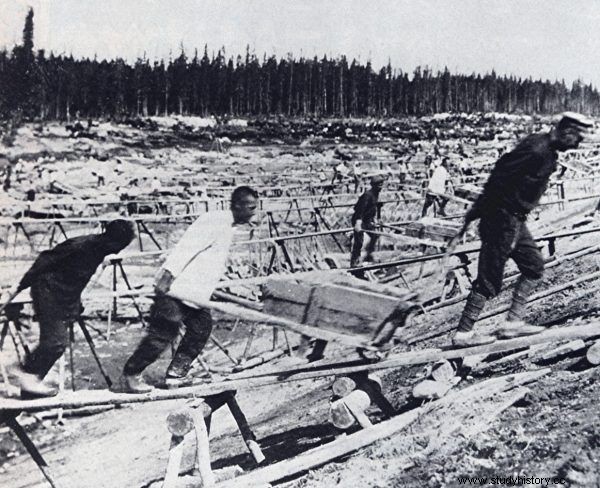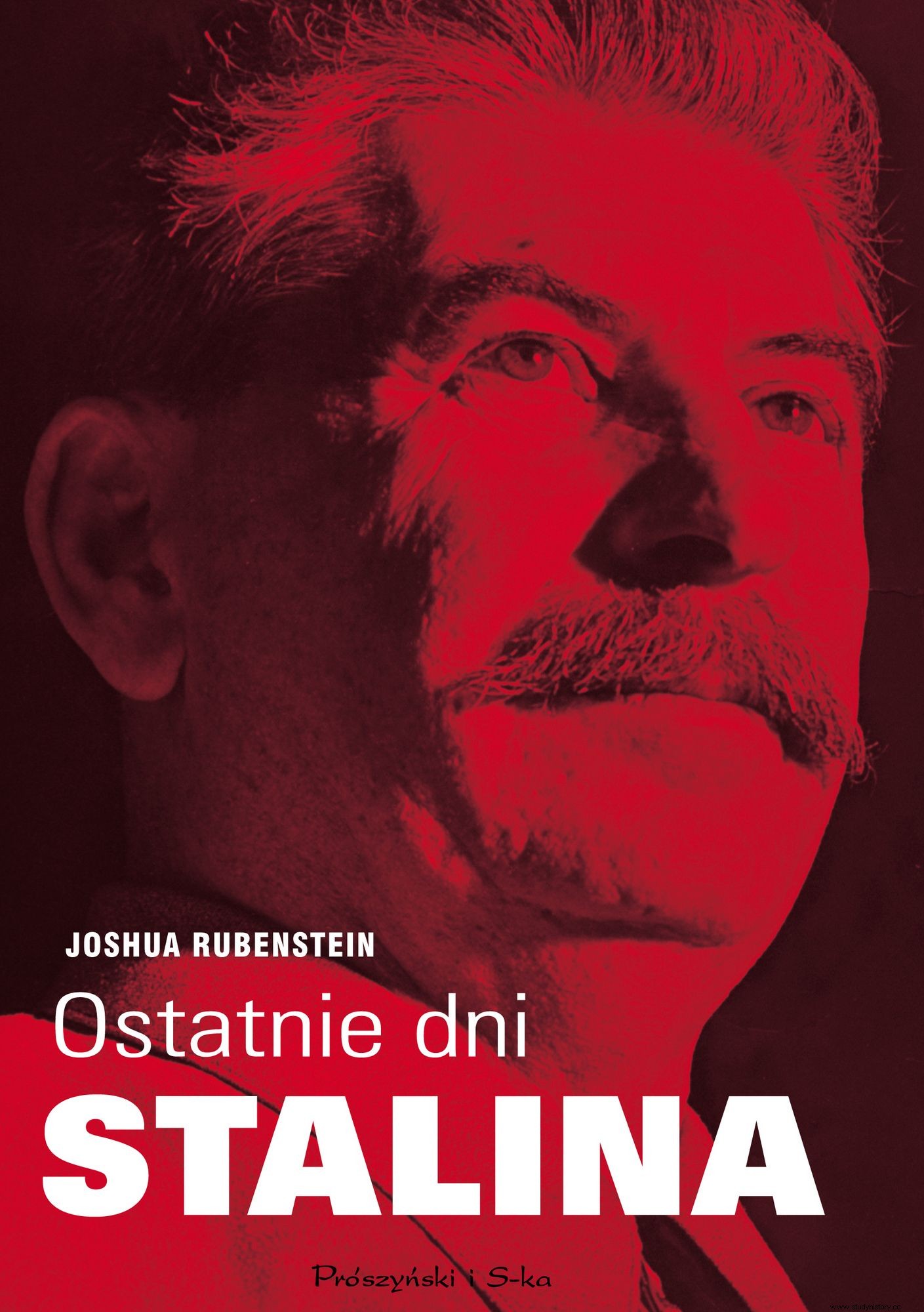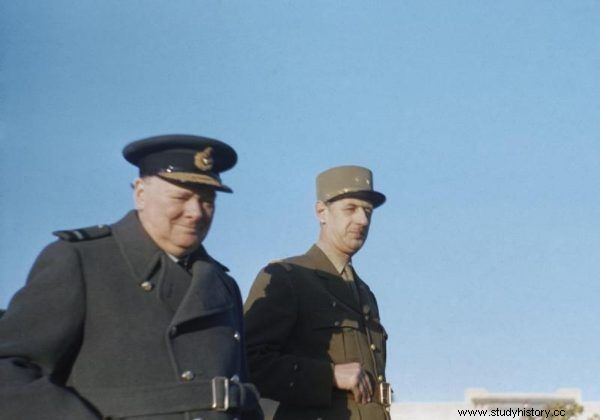Millions of victims on the back of the neck did not prevent the commander of the USSR from joking about mass executions. The victims of his indiscriminate pranks were both random people and his closest associates. He did not care about the presence of anyone, including foreign officials.
"Nosenko, you haven't been shot yet?" - Stalin joked at the sight of the commissar of the shipbuilding industry. "They haven't arrested you yet?" He would throw on another occasion. Nosenko could only reply with a smile and pray that the dictator would not turn the wit into a directive.
Such jokes could give you a heart attack. In the Soviet Union, anyone - a high-ranking apparatchik and an ordinary peasant - could end up in the gulag under any pretext.
The jokes about shooting everyone around had a permanent place in the despot's humorous repertoire. And they often turned into reality.
During a banquet in honor of foreign guests in December 1945, Stalin toasted Novikov, the commander of the air force. He said:“For the good marshal, let's drink for him. And if he doesn't do his job, we'll hang him. " Soon Novikov was in fact arrested and sent to a camp. It is not known if he did not perform well in his position, if he fell in love with Stalin, or if he was simply too weak in his head ...

Stalin - probably the only such person in the entire Soviet Union - liked to joke about sending people to the Gulag.
And he could have killed!
During the Italian invasion of Abyssinia, Stalin ordered the security people to immediately establish a telephone communication with Ras Kasa, the leader of the mountain tribes. The young soldier almost passed out from fear, reporting to the dictator that the connection was impossible. "And you are responsible for security," laughed Stalin.
A sense of humor was an important tool in the dictator's work. His surroundings admired him, especially young specialists who, thanks to large-scale purges, at a very young age, only a few years after their studies, could hold high positions in the state administration. Stalin always had time for them, he listened to them, answered questions and joked.

The jokes with people from the closest circle did not end well for the dictator of the USSR. Joshua Rubenstein writes about it in his book "The Last Days of Stalin" (Prószyński i S-ka Publishing House).
This does not mean, however, that he was indulgent. The leader of the Soviet Union liked to laugh at the exaggerated ambitions of the new tops. On the list of candidates for the award, he wrote:"Gówniarze get the order of Lenin!".
He could also sharply express his opinion about the actions of subordinates. He appointed Admiral Isakov as deputy naval commissar. He replied that he did not have a leg, and that would interfere with his duties. Stalin painfully retorted:"the navy is led by headless people, one leg is not an obstacle."
The victims of the dictator's jokes had one consolation:he was only joking, and he could have killed!
We just shoot the diplomats…
In telling rough jokes, Stalin did not bother either with the diplomatic protocol or with the presence of foreign guests of the highest rank. Sheila Fitzpatrick in the book “Stalin's Team. Dangerous years of Soviet politics ”gives this example of the behavior of the leader of the USSR. In August 1939, Joachim von Ribbentrop flew to Moscow for talks on the Soviet-German alliance. During the gala dinner, Stalin shocked the Minister of Foreign Affairs of the Third Reich by proposing a toast:"To Stalin, the new anti-Comintern!" The head of Soviet diplomacy, Vyacheslav Molotov, conceded this by stating that "the Germans never understood the Marxist sense of humor."

Ribbentrop might have been shocked to discover Stalin's sense of humor. The photo shows the signing of the Soviet-German friendship treaty on September 28, 1939.
During the Yalta Conference, Roosevelt noticed Beria and asked who he was. As we read in the book by Simon S. Montefiore, “Stalin. Court of the Red Tsar, ”the USSR leader replied,“ Oh, this one. This is our Himmler ", which caused the general consternation of the assembled guests.
Stalin was able to keep the remnants of decency with the leaders of the greatest powers. However, when dealing with a weaker partner, he became haughty. Additionally, the victories of the Red Army made him even more cheerful. France turned out to be an unworthy partner for talks for Soviet diplomats in 1944, when General de Gaulle visited Moscow. There was an impasse, the French side did not want to sign the treaty on alliance and mutual aid. The bone of contention was the Polish government of Bierut, for which de Gaulle refused to support. The Soviet dictator decided to solve the problem with proven methods. He stated that the misunderstanding would surely disappear if they… sit down and drink together.
During the banquet, the already somewhat drunk leader of the USSR pointed to General Chrulov and exclaimed:"He better try, otherwise he will hang, as is the custom in our country!" Seeing General de Gaulle's disgust, he added:“People call me a monster, but as you can see, I'm kidding about it. Maybe after all I'm not that scary. When he noticed that Molotov was arguing about the treaty with Bidault, the French foreign minister, he proposed:“Bring the machine guns. We will get rid of the diplomats. ”
Stalin did not charm the proud leader of France with his sense of humor, and the treaty was signed without the recognition of the Polish communist government.

The visit to Moscow ended in various ways for foreign delegations. Charles de Gaulle left disgusted, and Churchill had to treat a giant hangover. The photo shows both gentlemen in 1944 in Morocco.
Manipulator, joker, criminal
Stalin used his sense of humor to win the sympathy of those around him, but he also liked to humiliate and emphasize the undeniable power he had over the lives of other people.
In the second half of the 1940s, when Stalin began to seize anti-Semitic paranoia (the unleashed campaign contributed to the death of the USSR leader), the security services began collecting materials on Molotov's wife, Polina Zemczżyna, who was of Jewish origin. Evidence was fabricated, her friends were interrogated. Ilija Steinberg, one of Żemczżyna's lovers, and privately the husband of her niece Rosa, described in detail their sexual adventures together. Stalin, seeing the report of the interrogation, instead of hiding it in the innermost drawer of his desk, decided ... to send it to all members of the Politburo, including Molotov himself!
The only thing the betrayed husband could be comforted with was the fact that he and his wife did not end up in the camp. Other addressees, on the other hand, instead of laughing at the thought that they would meet a similar joke.
Stalin loved to party, drink, eat, joke and party until late at night. He forced members of the Politburo to eat together. Even in the last hours of his life, the dictator was in a good mood. After the party full of water, he said goodbye to the guests leaving his villa in Kuncewo. This is how Joshua Rubenstein describes it in his book “ Stalin's Last Days ":
According to Khrushchev, Stalin was "drunk and in a great mood after dinner". He escorted the guests to the door, making good-natured jokes, and Khrushchev "jokingly poked his finger in the stomach, referring to him with the Ukrainian 'Mikita' accent." It was Stalin's custom when he made him humorous. ”
Then Stalin suffered (probably) a stroke and died in agony for several days. Perhaps if he had not been so much fond of his subordinates, the "comrades-in-arms" would have taken more vigorous action to save him. A sick sense of humor and instrumental treatment of subordinates took revenge on the leader of the USSR.
Buy the book on Empik.com:

